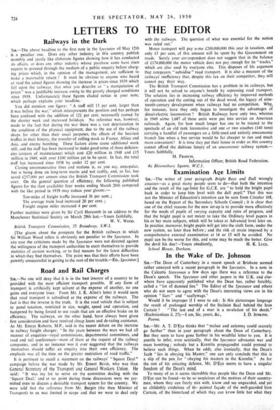LETTERS TO THE EDITOR
Railways in the Dark
SIR,—The above headline to the first note in the Spectator of- May 12th is a peculiar one. Does any other industry in this country publish monthly and yearly like elaborate figures showing how it has conducted its affairs, or does any other industry whose purchase costs have risen require to proceed through the medium of a public enquiry before charg- ing prices which, in the opinion of the management, are sufficient to make a reasonable return ? It must be obvious to anyone who heard or read the actual figures showing the increase in prices since 1939 which fell upon the railways, that what you describe as " a manipulation of prices" was a justifiable increase owing to the greatly changed conditions since 1939. Unfortunately these figures eluded notice in your note, which perhaps explains your headline.
You did mention one figure: " A staff still 13 per cent. larger than it was before the war," which misrepresents the position and has perhaps been confused with the addition of 121 per cent. necessarily caused by the shorter week and increased holidays. No reference was, boy/ever, made to the fact that during the war there was a vast deterioration in the condition of the physical equipment, due to the use of the railway shops for other than their usual purposes, the effects of the heaviest traffics in their history, the transfer of rolling stock to France, Africa and Asia, and enemy bombing. These factors alone cause additional work still, and the staff has been increased to make good some of these deficien- cies (arrears of maintenance) which cost £20 million in 1948 and £15 million in 1949, with over £100 million yet to be spent. In fact, the total staff has increased since 1938 by under 12 per cent.
Closing unremunerative lines and stations is, as you say, unpopular, but is being done on long-term merits and not rashly, and, so far, has saved £257,000 per annum since the British Transport Commission took over. On the general question of efficiency, the following published figures for the (last available) four weeks ending March 26th compared with the like period in 1939 may reduce your gloom:- Ton-miles of freight traffic increased 36 per cent.; The average train load increased 20 per cent. ; Freight engine miles increased 4 per cent: Further statistics were given by Sir Cyril Hurcomb in an address to the Manchester Statistical Society on March 29th last.—Yours faithfully, W. V. WOOD.
British Transport Commission, 55 Broadway. S.W.I.
[The gloom about the prospects for the British railways to which Sir William Wood refers is obviously not peculiar to the Spectator. In any case the criticisms made by the Spectator were not directed against the willingness of the transport authorities to exert themselves to provide statistics of current working, or to find reasons for the latest difficulties in which they find themselves. The point was that their efforts have been patently unsuccessful in getting to the root of the trouble.—ED., Spectator.]






































 Previous page
Previous page